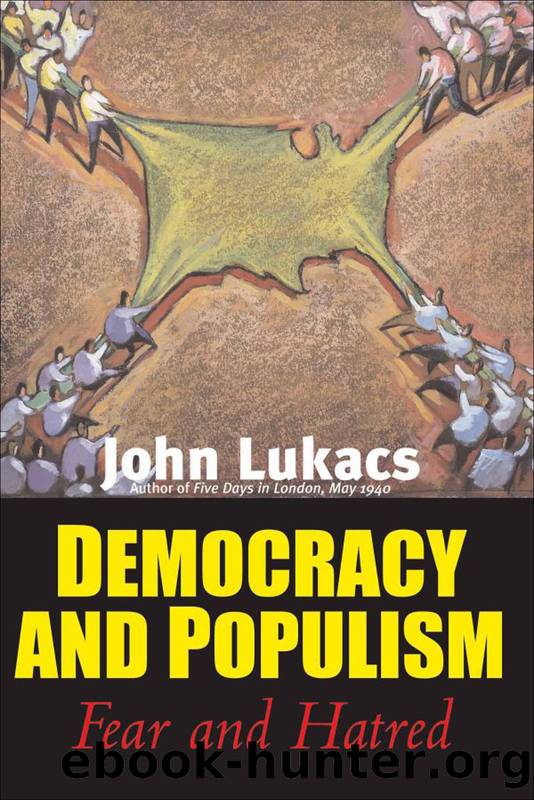Democracy and Populism by John Lukacs

Author:John Lukacs
Language: eng
Format: epub
Publisher: Yale University Press
Published: 2005-07-14T16:00:00+00:00
And of course Stalin was no ideologue either. Despite having been born in Georgia, he was a Russian nationalist. Evidences for this are myriad and multiform. His hatred and expulsion of Trotsky, his liquidation of many of the International Communists in the purges of the 1930s were stark and early proofs of his inclinations—indeed, of his convictions. There are many, many evidences of his nationalism—conveniently ignored by the lately so industrious anti-Communist intellectuality. Two trenchant examples. As early as 1934, but then again in July 1940, an article by Marx’s friend and patron Engels, “On the Foreign Policy of Russian Tsarism,” was about to be published in a leading Russian Communist journal, Bolshevik. Andrei Zhdanov, already suspecting Stalin’s inclinations, thought it necessary to submit it to him. Stalin’s written notes were: “Aggressive vileness is not a monopoly of Russian tsars.” “In attacking Tsarist foreign policy, [Engels] resolved to deprive it of any trust.” In April 1941 he told Georgi Dimitrov, the head of the Communist International: “The International was formed in Marx’s time in the expectation of imminent international revolution. The Comintern, too, was formed in such a period in Lenin’s time. Today the national tasks of the various countries have priority. … Do not cling to what was the rule yesterday. Take strict account of the new conditions that have arisen.” We ought to recognize that Stalin’s termination of the Comintern in 1943, his substitution of a Soviet Russian national anthem for the “Internationale” around the same time, his easy propagation of nationalist themes, his adoption of the names of Kutusov, Suvorov, Bagration for high military medals or for the code names of military operations, his restoration of other Russian traditional military symbols, his support of the Russian Orthodox church hierarchy, etc., were not tricks to mislead or to impress his allies; nor were they altogether opportunist measures to nourish his popularity among masses of Russians but genuine examples of his increasingly nationalist ideology. (In his single speech after the victory in Europe, in June 1945, he praised the Russian people, without saying a word about Communism, or about the Party.)
But more is involved here than the recognition that Stalin—like Hitler or Mussolini or many other dictators—was a nationalist. There was a fundamental difference between Stalin and Hitler (as there was one, too, between Hitler and Mussolini though of much lesser importance). Even before the emergence of his nationalist consciousness, Stalin recognized (unlike Trotsky, but also unlike Lenin) the importance—nay, the priority—of the state. This of course was but one source of his early confrontation with Trotsky, when Stalin recognized the—obvious—priority of the Soviet Union (“Socialism in One Country”) over the propagation of International Communism. Another, perhaps more telling, evidence exists in a telegram that Stalin sent to Orzhonikidze as early as in September 1931. He criticized the Central Committee and the Politburo, and especially Kaganovich (the Jewish member of the Politburo who was close to him but from whom he gradually distanced himself during the 1930s, even though Kaganovich remained the only Jew in the Politburo till the end).
Download
This site does not store any files on its server. We only index and link to content provided by other sites. Please contact the content providers to delete copyright contents if any and email us, we'll remove relevant links or contents immediately.
| Anarchism | Communism & Socialism |
| Conservatism & Liberalism | Democracy |
| Fascism | Libertarianism |
| Nationalism | Radicalism |
| Utopian |
The Secret History by Donna Tartt(19085)
The Social Justice Warrior Handbook by Lisa De Pasquale(12190)
Thirteen Reasons Why by Jay Asher(8909)
This Is How You Lose Her by Junot Diaz(6885)
Weapons of Math Destruction by Cathy O'Neil(6279)
Zero to One by Peter Thiel(5801)
Beartown by Fredrik Backman(5751)
The Myth of the Strong Leader by Archie Brown(5507)
The Fire Next Time by James Baldwin(5442)
How Democracies Die by Steven Levitsky & Daniel Ziblatt(5218)
Promise Me, Dad by Joe Biden(5153)
Stone's Rules by Roger Stone(5087)
A Higher Loyalty: Truth, Lies, and Leadership by James Comey(4960)
100 Deadly Skills by Clint Emerson(4924)
Rise and Kill First by Ronen Bergman(4788)
Secrecy World by Jake Bernstein(4752)
The David Icke Guide to the Global Conspiracy (and how to end it) by David Icke(4717)
The Farm by Tom Rob Smith(4507)
The Doomsday Machine by Daniel Ellsberg(4490)
